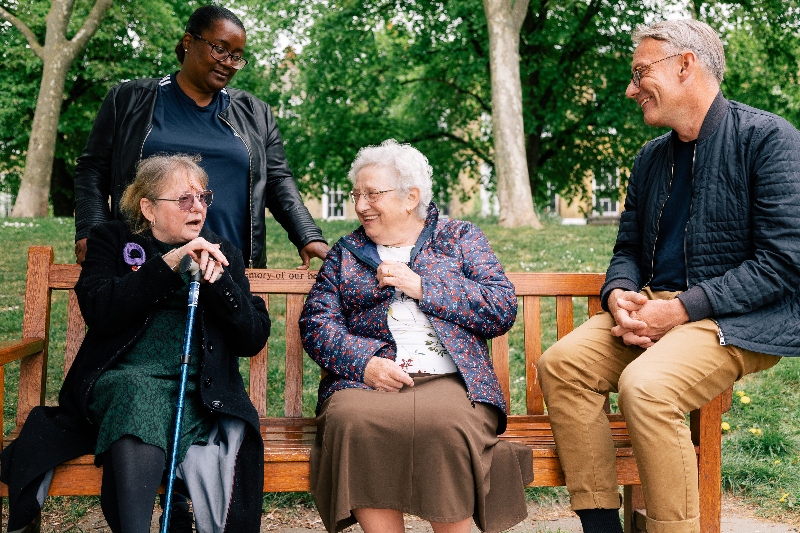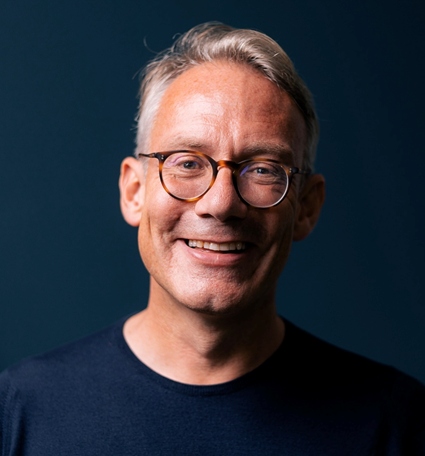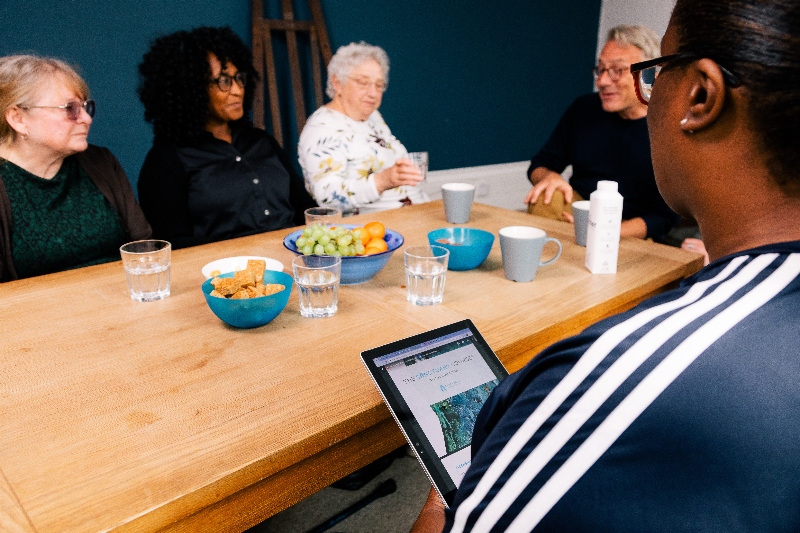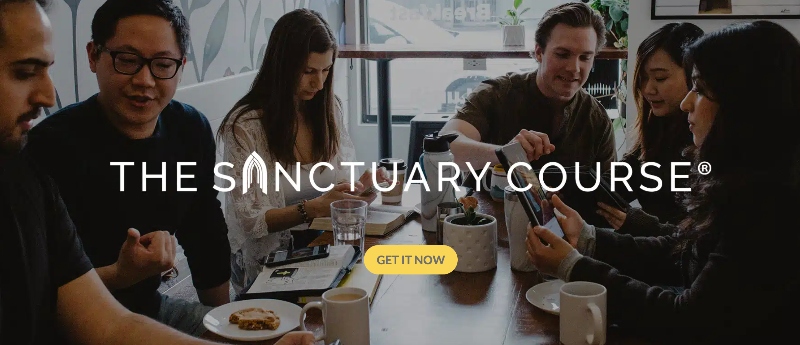‘Enabling people to be deeply human in safety’
Sanctuary Mental Health Ministries equips the church to support mental health and wellbeing.
Baptist minister Shaun Lambert spoke with its UK Director Corin Pilling in a wide-ranging conversation that encompassed the needs of leaders, the role of art and music in wellbeing, neurodiversity and much more

Shaun Lambert: I wanted to ask what you did before directing Sanctuary Mental Health Ministries here in the UK - there’s probably a theme behind it all?
Corin Pilling: I suppose there are two angles to it. One is that most of my working life I have spent alongside homeless people. That’s 20 years exposed to the gift of people’s resilience and ability to adapt to very difficult life experiences.
And on the other hand, sometimes very devastating impact around issues of trauma and addiction. I got to the point in that work where I realised, I was at a bit of a crossroads. The only way up was away from people and projects.
I then started thinking what might be a good step forward. For a while I’d known about an organisation called Livability. I really liked what they did. They had a team who supported churches with disability awareness and training around community development. A role there came up to lead their community engagement work.
As deputy director of that team, I took on several projects that were starting to look at issues of disability and dementia to develop resources for churches. At the heart of much of the work they were doing was a question, ‘what does it look like to create communities where everyone can take part?’
And that drew me into thinking, there’s a big gap here around mental health. Then, with permission, I piloted a day training course for churches looking to integrate some theology into this as well as bring people up to speed about some of the impacts around mental health. Using this model of looking at how to build a community where everyone can take part.
Things changed at Livability and their appetite to develop work around mental health diminished. I was still thinking there’s a real need for this and at that time I had got to know Sanctuary and had admired them from afar.
I think the elements I appreciated were they took the theology seriously, they took expertise around mental health seriously, and they took the stories of people who were impacted by their mental health challenges seriously.
I saw this organisation who were dynamic who had developed an approach and a course that really resonated with me. And in all honesty, I looked at what they had produced and thought ‘wow’ - this is just a much better version of what I was hoping to produce!
One thing led to another and in their entrepreneurial way they made me an offer, would I be interested in developing their work in the UK.
The personal layer - getting close to burnout
 So that was the professional side, but I think there’s an underrunning theme which for me has always been around my own journey, coming to terms with my own limitations… experiencing a level of compassion fatigue and getting close to burnout working with people who were very vulnerable and often had many challenges.
So that was the professional side, but I think there’s an underrunning theme which for me has always been around my own journey, coming to terms with my own limitations… experiencing a level of compassion fatigue and getting close to burnout working with people who were very vulnerable and often had many challenges.
And I think also my own healing journey around my mental and emotional wellbeing. I’d found real benefits from therapy, from contemplative prayer and that overlaps a lot with the work you’re interested in around mindfulness.
This was a spiritual journey really, one we all go on, where we come to the end of ourselves. I realised things had to be done differently and I think I’m still on that journey.
Having to look at what does it mean to have a flourishing life? What does it mean to be deeply human? These are some of these questions I bring into the work at Sanctuary now.
As well as using the Sanctuary model I was given room to develop what would work well here contextually. And I found early on in the pandemic I had real concerns around wellbeing for leaders. That led to a few pilot projects around how we manage our energy and prevent burnout within leadership roles. That’s probably something really close to me and has continued to evolve.
SL: I don’t know what you think but I think if you’ve experienced hitting the wall or getting close to the edge it makes you more able to be compassionate, non-judgmental to other people who’ve experienced the same thing. Whereas if you’ve always been well it can be harder not to judge, ‘why are you not coping?’
CP: Absolutely… and I think in the church we elevate the resilient. The people who are exceptionally stress-resistant, well they’re rare. It’s not normal… (laughter). And yet we raise them up…
SL: And say everyone should be like that.
CP: It’s true it becomes the benchmark. I think that’s the difficulty. I think the other thing I realised that comes out of these experiences of burnout and compassion fatigue is that often many of us experience deep self-judgement, and so the more that somebody in the space that I’m in can say, ‘what you’re experiencing is a normal, let’s look at what you can do to recover,’ that really helps.
We are in spaces where we are holding a lot and we expect our leaders to be carrying hope when they’re struggling, and it’s difficult to do that when you’re not experiencing that hope yourself.
Context and a holistic approach - healing through art and music
SL: Thank you… now you talked about Sanctuary which is Canadian-based and the importance of its UK context – in their context they seem to be very holistic: you’ve got art, with the Healing In Colour project with stories of race, faith and mental health; you’ve got Sanctuary Songs about mental health in partnership with The Porter’s Gate collective… that’s really unusual I think in mental health and especially Christian mental health… to recognise that these things are healing in themselves.
CP: It’s very easy to think the biggest shift comes around conversations around mental health but you’ve got to know you want to be part of that conversation to benefit. The wonderful thing about art is it touches so much of us so deeply.
And there’s an accessibility often to art in terms of opening expressions around mental and emotional wellbeing… it feels to me like it’s an area which is innately spiritual, it doesn’t need explanation.
There’s a lovely story around Sanctuary Songs as well… we did a launch event in London – really fortunate to have the musicians who were involved from The Porter’s Gate in this project, which came out of them listening to the stories of people who were participating in the Sanctuary course, heard a bit about the theology of mental health, heard John Swinton speak… and they went away and wrote songs based on that listening.
A woman came up to me at the end of it, and it was amazing… and said, ‘tonight is the first time in my Christian life that I feel that the worship has been for me. I’ve lived with depression all my life and I feel really met in this.’
And I keep hearing stories like this. It’s really humbling to be involved in. And there are different ways that will come. It might come through a painting… Equally with the music… I found it gifting personally just being able to access those songs through particularly difficult experiences. I mentioned earlier I lost my father this year. To experience grief and connect with music that reminds us God is with us in those difficulties, in the darkest times… so helpful.
'When I’m feeling anxious... the first thing I need to do is to focus on my breath'
SL: I was just looking at some of the lyrics in the Centering Prayer song –
‘I wanna be where my feet are, I wanna breathe the life around me… The ground below me is how you hold me…’
That's a very embodied thing!
A lot of spirituality is very disembodied and so we don’t find the healing because we are trying to do something impossible, which is to lead a disembodied life. But it sounds like as well as the creativity, it is a much more holistic way of looking at things.
CP: It is. And that song you mentioned, I think some of us are starting to see that the best sort of spirituality is ground up. I know for myself there are times when I’m feeling anxious it doesn’t really help me to look at scripture.
The first thing I need to do is to focus on my breath. That will help me get to a place where I feel calm where I can then come to scripture.
I won’t necessarily go there until I’ve paid attention to my body. I love that is coming through in a song like that. It feels true to my experience.
SL: That’s really helpful. I still get Christians who tell me they’re struggling with their mental health and yet they still get told in their church, ‘you need to go straight to scripture…’
But what they really need is something before that… to find a bigger place within where they can then look at the wisdom of scripture from.
People of colour and a wider perspective on mental health
You mentioned people of colour and their perspective on mental health, and again that’s a much wider way of looking at things. Is that something you’ve been able to bring into our context in the UK?
CP: In all honesty the routes in have been a bit tougher. It’s been difficult to establish links. Having said that the communities that have used the Sanctuary course, many benefit incredibly from it.
Within the course there’s diversity both in terms of experts and those with lived experience. It’s a start.
We’re aware of the fact that there are specific issues that are impacting communities that are not majority white. And we’d love to have more of a dialogue with leaders to see if there’s anything we can do to be of service.
I have someone working with us, Janice Gittens. Janice is a therapist and born in Grenada, raised in London. She’s been leading on this project and brings an immense wealth on the mental health side and understands perhaps some of the barriers that some people have found in talking about their problems around this topic.
What I would say there’s a real need and we would love to do more. Within black-led churches there are already people doing things. Also, I’m not suggesting we are the experts in this.

What’s distinctive about Sanctuary's UK work
SL: Yes, it’s great you’ve got the same breadth of vision. So would you say that there’s anything distinctive about what you’re trying to do hear in the UK… and you’ve touched on it a bit.
CP: There are two things I would say, maybe even three (laughter…). One is I’d like to be producing more UK specific resources. Something that’s been a surprise to me is that Prison Chaplaincy have picked up on the Sanctuary Course and found it incredibly helpful for opening conversations around faith and mental health in their settings. And that’s gone very well in Scotland.
It’s obviously got us thinking - well it wasn’t designed for that – how can we develop more?
I think the other thing is I am keen to help leaders, equip them with the tools they need, increasingly recognising we are working within systems that can work against our wellbeing. How do we create spaces that are able to acknowledge that, acknowledging complexity whilst helping people find agency around what is possible? As an outside organisation we can create safe spaces as we are not invested in the institution; we are invested in the people.
The third thing is that when you label something mental health it tends to interest people either who are either directly impacted or supporting those people who are. There is a much deeper question of what it means to be human which I’m interested in. You may remember we developed a resource early in the pandemic helping a congregation through that entire journey called Finding Light in the Deepest Dark. We found that really resonated with people. I’d love to do more of that.
SL: Yes, that resonates… There’s a theologian and a psychiatrist who says wellbeing is paying attention to what matters most. This enfolds mental health in something bigger rather than separating it out. Also, the idea that wellbeing isn’t the absence of pain, but remaining steady in the middle of pain whilst holding onto what is good.
CP: That’s a lovely phrase I think, holding onto what is good. Would that be Chris Cook? (Yes!) … John Swinton says something similar… this idea of measuring wellbeing by our relationship with God and others, that sense of mutuality, quite shalomic in its essence.
SL: What comes across in what you’re doing is the ability to have honest conversations, and naming what is going on, which people can struggle to do but which can be very helpful.
CP: There are lots of reasons why it’s hard to feel safe. Many of our colleagues in ministry can end up in great isolation around the specific challenges of leadership. People can’t open up unless they feel safe and it takes a while to get there.
There is a view out there, we want more vulnerability from our leaders. But it’s very costly to be vulnerable as a leader. I think it’s important to recognise that vulnerability isn’t for everybody but can exist in certain spaces, and we’d like to help create such spaces.
SL: One of my counsellors once said to me if you present as invulnerable, people will assume you are and think they can say what they like to you. I think you need to show people you are human. It’s very easy to dehumanise a leader.

The Sanctuary Course
Two years ago you wrote an article for The Baptist Times on the Sanctuary Course, what would you say has changed?
CP: We’d rewritten the course and wanted to spend much more time on the stories. People respond to story and want to listen and understand when people get into difficulty because it’s a universal human experience.
For the communities that have used it and get it the course has become very dear to them to the way they do ministry. It’s not really about the course - we want to see communities created where there are greater levels of safety, where people are feeling supported appropriately, but also recognising our limits.
There’s one church I’m thinking where it was run in lockdown, and one person who was having a very difficult time realised perhaps for the first time that what they were experiencing, God was not absent from.
It’s these times of loneliness when we think we are truly on our own - and suddenly we are reached that is transformational. And it’s not just on the leader, hopefully everybody realises they have something to bring. Hearing these stories, that really gives me fuel for this work.
We have a way to go. And hopefully connected to all this we’ve got The Sanctuary Youth Series coming out which is launching in January. There’ll be a first module in October. That was developed in conversation with a 100 young people around mental health, faith and community. It’s aimed at 11- to 15-year-olds and we’re really excited about it.
Neurodiversity
SL: Some of the unheard stories out there are around neurodiversity, is that something you are looking at?
CP: That’s an important question and we are looking at how we might produce resources that would help those who are neurodiverse as well as communities. At the heart of it is really listening to each other. I know it sound so simple.
But in the conversations, I’ve had with those people who are neurodiverse that’s often where problems come up, they’ve just been treated with a broad-brush approach. That would begin to help with the issue of where neurodiverse people have felt marginalised in their community.
SL: I think the safety thing as well, if you feel like you can unmask and be yourself and be listened to, this is better than techniques and all those things.
But thank you Corin, I’ve really enjoyed the conversation. I think we are really talking about sanctuary in all its definitions, safety, community and the sanctuary God’s presence can be. Hope all goes well with the new course and your other plans.
CP: Thanks Shaun!
Corin Pilling is UK Director of Sanctuary Mental Health Ministries. Having worked with homeless people for 20 years, he led the community engagement work at Livability, developing resources and training, engaging churches on disability, dementia and wellbeing before leading the work of Sanctuary in the UK.
Shaun Lambert is a Baptist minister, psychotherapist, writer and mindfulness researcher whose latest book was published earlier in 2024: Mindful Formation: A Pathway to Spiritual Liberation
Do you have a view? Share your thoughts via our letters' page.
Baptist Times, 30/09/2024